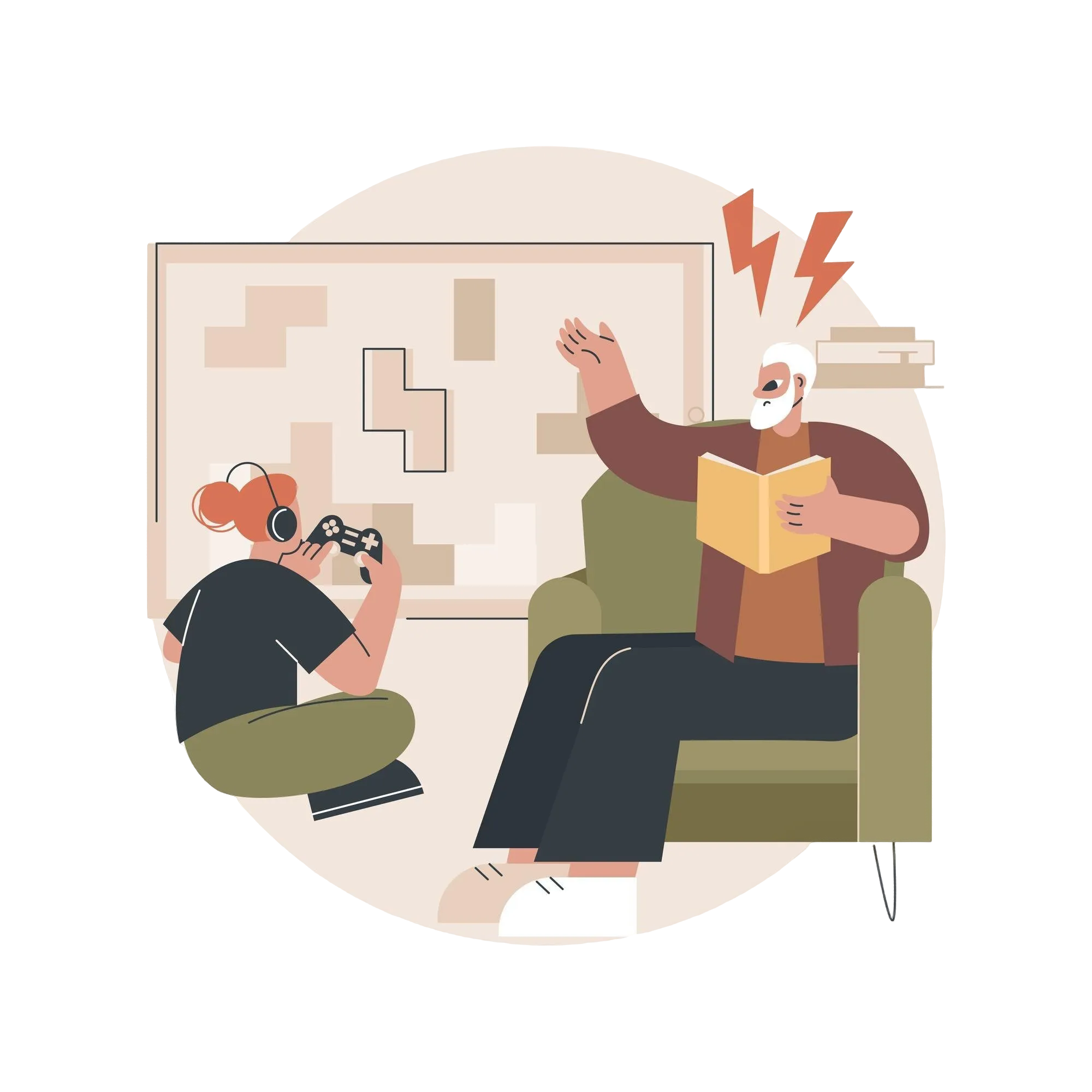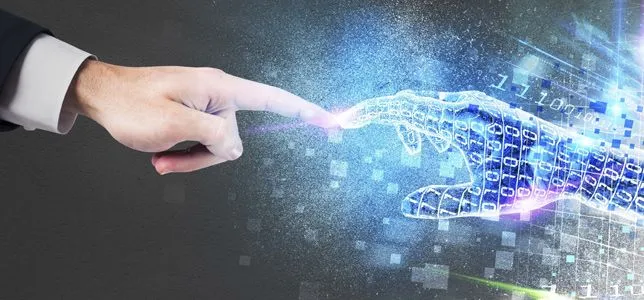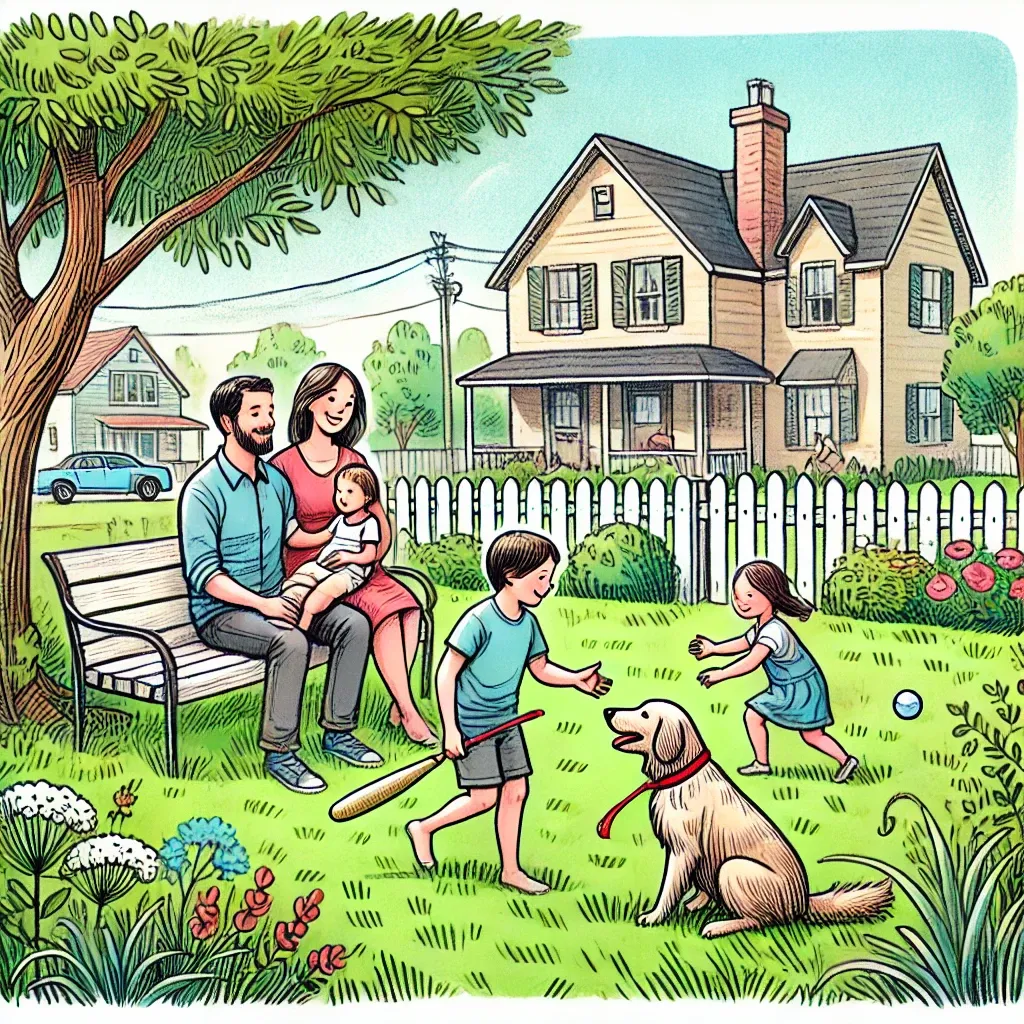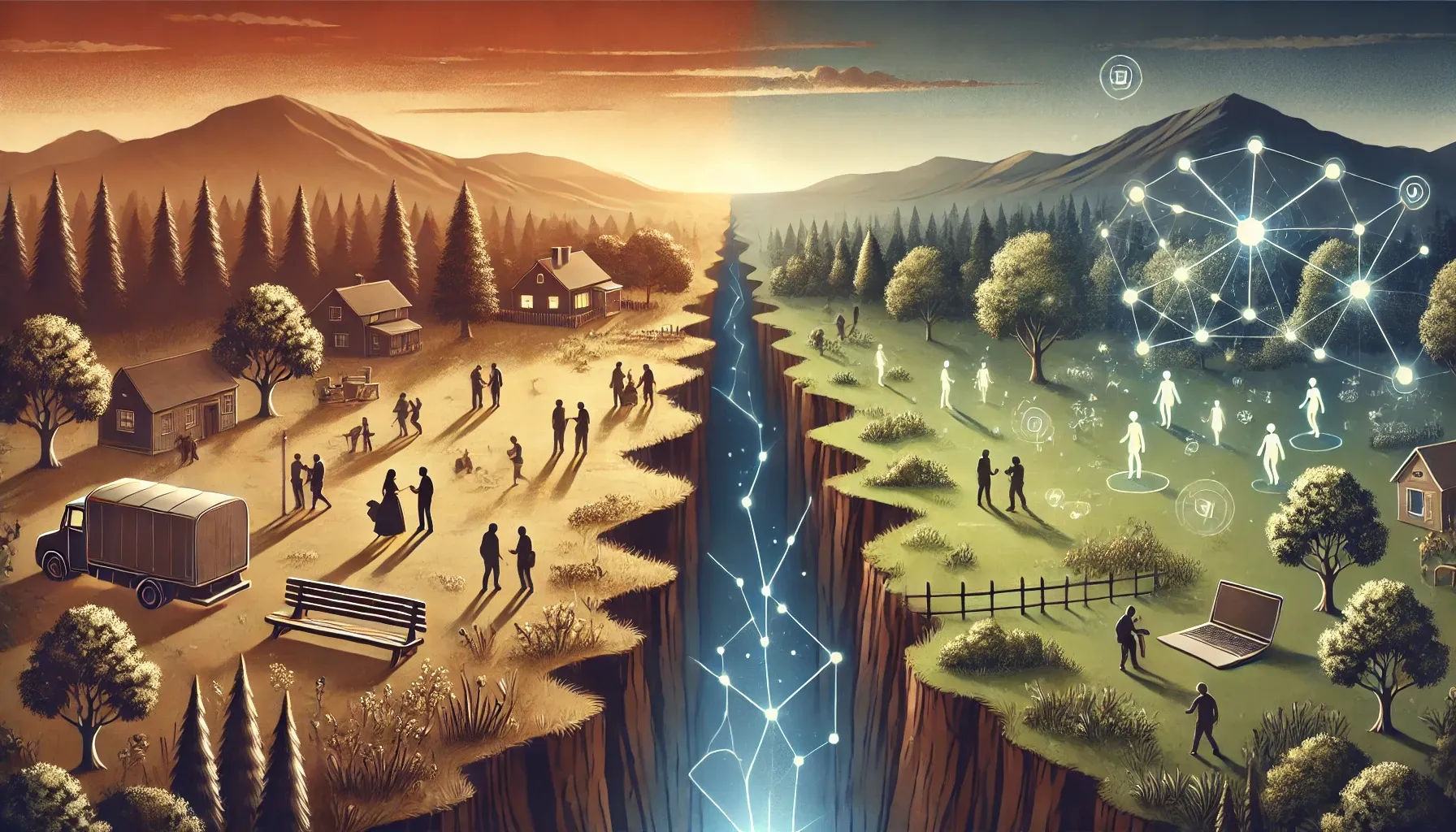On the Digital Generation
Chapter 3: The Generational Divide

You’ve heard through my story about how human the digital realm can be. I have a lot of love and care for the communities there, and I hope the previous chapter captured that.
But, what about the others? Do those that live and thrive in a more physical world see digital spaces that way?
What about you, reader? Do you come in with some preconceived notions of digital spaces?
Unfortunately, I have not found much of an audience for this story of mine. They either dismiss these stories as immature, or they just might not be aware of them. They don’t have the curiosity to ask, nor do they have the openness to listen. And it doesn’t feel all that great when the my friends don’t seem to care about it.
This phenomenon I’m explaining here is known as the generational digital divide. In short, there is growing gap between those who use technology, and those who don’t. It is a gap that is urgent to fill, as my generation is also the most secular. At Lausanne 4, Michael Oh emphatically stated:
Young people are hopelessly inaccessible and lost if we do not enter their digital world and engage them with digital tools. We need strategic intentionality to reach the younger generations or we will lose the future.
To close this gap, we will need to need to understand what is causing this divide to grow, at a human level. But this is a very difficult and complex thing to uncover. My goal for this chapter is to try to explain some nuances that I can see that help contribute to the closure of this gap.
Much of this chapter will be my own
observations
, but I hope they ring true for you as well.
Two Different Worlds Collide

First, I want to define this digital gap. My understanding of this gap is that there are two generations of
people:
-
We have the analog generation who found family and local communities to be a regular part of their lives. Often encompasses the older generation, but can include anyone who prefers physical communities.
-
We have the digital generation who relied on digital spaces instead. Often encompasses the younger generation, but can include anyone who prefers digital communities.
These two camps often disagree. For example, older church leaders often dismiss social media as evil and dark. On the other hand, the younger generation likes to spend less time outside and would rather go online instead. What I argue is that these two generations have world views that are drastically different from each other, and that lack of understanding is what breeds contempt.
First, let’s take a look at these two different generations and the worlds they grew up in.
The
Analog
Generation
The analog generation grew up during a time when technology was present, but communities weren’t formed around them. Television and music players were digital devices, not digital spaces. So while this generation was familiar with technology, community and society was still analog.
With this context in mind, I’m going to make a few observations here on how this generation may have operated.
1. People went to the local community for connection and wisdom.

Created with DALL-E
I think the analog generation relied heavily on nearby family and friends for their social life. Internet did not exist to the broader public, and cellular technology was nascent. Even if you wanted to talk to some on the phone, you were restricted to numbers found on neighborhood yellow pages/phone directories. This meant one’s social life depended on their local communities.
I’m sure family played a critical role as well. From the many I’ve talked to, the idea of a nuclear family was something that many of the analog generation hold dearly. Information wasn’t readily available during this time, so life lessons were primarily experiential. It was the parents parents and older figures in the community that provided these lessons, since they were the ones who experienced the most.
This theoretically works great if your nuclear family and local communities are secure and healthy, but this isn’t always the case. However, what happens if these communities are unhealthy, or even abusive? For example, what if a father taught his son that crying is not for men; does that son have awareness of any other way to cope with emotions? Or perhaps a child was raised in a toxic patriarchal household, where the father would abuse his wife and claim that “wives must submit”. Does that child have opportunities to learn of a different way? What if these environments were directly harmful to the individual? Is there a way for them to escape safely and find shelter elsewhere? Is there a space for someone in the analog world to find their own community and security?
This generation has seen the fruit of intentional human connection, because that was how they had to survive. But this generation, too, has dealt with the scars of not having control over your communities. Whereas some might have found flourishing in their family unit, others might have suffered trauma. And I’m not sure if they had any control over that matter.
2. Life was simpler with fewer distractions.
While technology still existed, the Internet did not. And because of that, globalization had not taken place yet, and the people of this generation were not as aware of what’s going on in the world. I hypothesize that a typical child would not know of many global matters as they explored their childhood.
I think this does quite a few things for the people in this generation. First, I think it makes the journey of life a lot simpler. If all you experience is your local community, I don’t think that you would experience a lot of diversity in lifestyle. So I’d imagine that your next steps in life were pretty aligned with that community’s culture.
Second, I think there was a lot of rest and downtime for this generation. When there wasn’t much going on in their local communities, people had to figure out how to pass time. There was no Internet to scour, no on-demand television, so I think this generation learned how be bored! Maybe that looks like hanging outside with friends at the local mall. Or perhaps that meant playing in the neighborhood. Or taking a scenic drive at night and grabbing some McDonald’s late at night. And I’m sure that downtime strengthened their reliance on their local communities as well.
3. Local communities shaped your passions and hobbies.
This generation may not have experienced diverse lifestyles, since they relied on local communities. I think this also applies to passions and hobbies as well. For example, if someone grew up in the church, they might know a lot about faith but not much about anything else.
Because of this, I think human curiosity was limited by their physical contexts. Of course, each community and culture has a multitude of passions and hobbies, but it’s still limited to just your physical context. And even if someone was interested in knowing more, how would they do so? Curiosity often came at the cost of security; if you wanted to learn more about the world you had to step out. And that is a tall order! Changing communities does grant you exposure to new lifestyles and wisdom, but it forces you to rebuild. This is not worth the risk for many.
Synthesizing these observations, I assume that the world view of the analog generation is the following:
worldview
The analog generation believes face-to-face human connection is the best way to have community. Your nuclear family and local communities are your primary support network and your source of wisdom and mentorship.
This generation doesn’t rely on the digital realm for connection. So, most of their human connections are with people who are physically close. There was no need to form connections with people online or around the world, you had everyone you needed right next to you.
The Digital Generation
Downloaded from FreePik
Now let’s take a look at the modern day digital generation. This generation, like the previous generation, also strives for community. However, this generation is also able to find this community in the digital realm. Here are some things I’ve noticed about the digital realm and it’s people:
1. The digital realm empowers human creativity and enables human flourishing.
We as Christians are quite familiar with the natural world and how good it is. In Genesis 1, we know that God was the one that created the physical world, and placed us on this Earth in His image to be co-laborers and co-creators with Him. He looked back and saw that all that He created was good.
While God shaped the natural world, humanity, under God’s provision and will, is constantly shaping the digital realm. We as humans use our God-given creativity to steward a world that we believed would help humanity flourish. And since creation usually reflects its creator, the things we create provide a look into our deepest desires, flaws, and nature.
The digital realm is no exception. This generation created a place that wasn’t defined by physical barriers and constraints, so that people all around the world can gather and flourish. Even if your family doesn’t listen to you, you can find your own family online. Even if your friends think your hobby is silly, there are some online who dedicate their lives to it. What if socialization was difficult for you physically? You can create your own community online.
2. Online netizens can find belonging despite physical constraints.

A netflix documentary of Ibelin details his rich life on World of Warcraft, despite being paralyzed in the real world.
One major drawback of local communities is that you are born into them and they are hard to leave. If someone back then finds that their family or local community can’t meet their needs, tough luck. Even if they decide to move and find something new, it’s a lot of sacrifice for uncertain gain.
There are lots of reasons why physical constraints may prevent community from flourishing. Community in the digital realm bypasses these, allowing people to find community in places they couldn’t before. Some examples include:
-
People that feel unsafe in their local communities.
Some examples here would include people who are bullied, people who are going through family abuse, social outcasts, and more.
-
People that have niche passions but do not have local communities to foster it.
The removal of third spaces makes it much more difficult to socialize with locals who have similar interests to you.
-
People that are physically incapable of communing physically.
Consider Ironmouse, a Twitch streamer. Despite being bedridden with chronic illness, she was able to garner world-wide attention through her singing talent, and became the most subscribed streamer of all time.
-
People that meet online because it is dangerous to do so in public.
Consider the Hong Kong protestors who use apps like Telegram to protest in a secure fashion. Telegram enables protestors to organize privately despite the watchful eye of governments.
Sometimes, the digital realm is just convenient! Why travel when I can just chat with my friend online? Why go to a bar to chat with the bros if we could do the same over a game of League of Legends?
3. The digital generation expresses their true self more online.
We’ve discussed how the digital realm enhances human expression in the form of creativity, but it also does so in the form of self-expression. At first glance, it may seem that communicating online feels very cold. After all, text and emojis can only go so far. But I’d argue that people are more comfortable expressing themselves online than in real life.
The reason why I believe this is because we find it easier to cry in front of a screen, than to cry in front of a human. There is a lot of shame associated with expressing negative emotions in public, but doing so in front of your computer or phone spares you of that embarassment. And because my texts feel more disconnected from my human voice, I find it easier to say how I’m really feeling online than in person.
You can definitely see this in gaming. People are a lot more comfortable expressing anger at their teammates, because they don’t have to deal with the consequences of their emotions. People are also a lot more comfortable expressing sadness and frustration too! For example, social media is a common forum for “trauma dumping”; an unhealthy way of venting out negative emotions someone is feeling.
Contrast this with the church example I gave back in my Lausanne blog post. At church, I feel that I actually cannot really express my true self, because church social rules demand happiness and good vibes. I’m not the only one, I know many others that are afraid to confess sins and show vulnerability in fear of judgment. Even the idea of asking for help at church requires vulnerability and I might receive judgment. But asking for help online feels safer since I’m so far removed from people I’m talking to.
I also want to add that it is not always good for humans to be able to express their desires so freely. As a Christian, I believe that all humans are quite broken, and the ability to express that brokenness freely causes many to see the digital realm as a dark place. I would agree, but I also want to add that the digital realm doesn’t add to the broken nature of humanity; it merely is a clearer picture of that nature.
4. The digital generation is more cynical, critical, and anxious.
The digital realm contains more than just community. The advent of the Internet came with globalization, which made our world a lot smaller and interconnected. We currently live in the information age, where information control is the defining characteristic of current human civilization.
There is a lot of good that this brings; information technology made GPS accessible to everyone with a phone, so travel was more accessible. Online news sources allowed people to educate themselves on global affairs. And if you were interested in any craft (cooking, pottery, etc.), information online allowed you to hone that craft.
However, this influx of information can do a number on us as well. The digital realm has given the public awareness of several important issues: climate change, housing crisis, economic crisis, looming war, local politics, job markets, etc. It is good that these topics are receiving more care and exposure, but it also provides distractions to one’s daily life, and it can also increase anxiety and cynicism.
This exposure to the harshness of the real world can also cultivate a heightened sense of critical thinking. The reason why the Internet is censored in certain authoritarian countries is so that the people do not gain access to information about the “outside world”. Suppression limits exposure to other schools of thought, that can challenge the status quo. Speaking about the church, the digital realm has exposed patterns of spiritual abuse within the church, which makes the online person wary and disillusioned of Christianity.
Looking at these observations, I’d summarize the digital generation’s worldview as such:
worldview
The digital generation believes community can and will flourish digitally. The digital realm enhances human expression, creativity, and collaboration by breaking down physical barriers.
This generation created the digital realm because they believed it will enhance the human experience. Maybe some were disgruntled with how limiting it was for community to be bound by physical proximity. Maybe others were envisioning a “phygital” future, where digital communities can add to existing physical support networks. Regardless of the reason, this generation wants to have more options how they do community.
The Rift

Created with DALL-E
When comparing these world views, I find a similar thread. People in both generations seek to find a community to feel seen and heard. For those who grew up in the analog generation, that need was primarily met in local communities. For those who grew up in the digital generation, the digital realm could also supplement their local communities.
Now what’s unfortunate is that while people in these camps have similar desires, their world views diverge as a result of their upbringing and community. And I argue that this divergence of world views is causing the divide.
Having different world views is nothing new. We as Christians often engage with people of different world views, even going so far as to sending missionaries out to unreached people groups. Then how is this digital/physical world view split so different?
I can think of a few reasons:
1. Same family, different culture
In the analog generation, a cohesive and united family is something that is the foundation to your social wellbeing. And as this generation has their own children, I believe that they try their best to achieve that within their own family.
Naturally, as they rear their kids, they would impart their wisdom onto their children based on the lives that they’ve learned. Since this was normalized back in their day, where wisdom was passed down to them from their parents, they assume that this would work fine as well. And usually, it does to some degree. After all, kids are heavily influenced by their family of origin.
But what becomes troublesome is if the children grow up in a different culture than that of the parents.
For example, I’m a second-generation Asian American. The life lessons learned from my parents may be difficult to understand, or they just might not make any sense. For example, I was always unsure why I needed to save face (an Asian culture thing) at church if the Western church values vulnerability. I also saw friends of mine make friends with their teachers at school, but the filiel piety taught to me made it difficult for me to lower my guard around teachers. It didn’t quite make sense.
The same is true for the digital/analog split. The culture of the analog generation is very different than the culture of the digital generation. However, it’s much more difficult to pinpoint because this culture difference isn’t based on ethnic or geographical differences, it’s based on the rise of information technology, something far less discrete since this field is constantly evolving.
We already know how difficult it is to get first and second generation families to reconcile, even knowing their world view differences. How much harder, then, is it for the analog/digital generation to reconcile, given that they might not be aware of their different world views?
2. Nobody is listening to each other
What compounds on the first point is that nobody wants to listen to each other’s world view!
I frequently hear Gen Z folks complain that their parents/grandparents don’t listen to them, and I also hear from parents and the elderly that the younger generation ignores them. Both sides believe that the other side doesn’t take the time to listen.
And I don’t think this is surprising. If someone older than me rejects my world because they’re adamant that they know a better way, I wouldn’t be so happy either. And vice versa; the younger generations claim to know all the answers after being out of school for two years, which makes the older generation laugh.
We are basing these solutions that we have on the worlds that we have lived in. The older generation has seen things fail that the younger generation hasn’t seen, but the younger generation is living in a far more informed and connected world than the older generation. We each know our own world the best, but we assume that the other generation would also understand where we are coming from.
3. Sometimes, the differences get personal
It’s not impossible to convince someone else of your world view; this is how Christianity spreads after all. But, what is tricky about this analog/digital split is that sometimes, these differences can hurt.
Consider a parent from the analog generation with children that are chronically online. Family dinners and outings lose their meaning if the children are never mentally present at the table or at vacation. And if the parent’s grew up valuing family unity and togetherness, seeing your own family break that value hurts.
Or consider a kid who relied heavily on their digital friendships. If someone downplayed those online friendships as insignificant, or perhaps even unreal, that person probably relied on physical friendships to thrive. And while their intentions might be good, they are effectively rejecting that kid’s world, and that hurts.
I think this hurt makes untangling this divide difficult; sometimes the divide isn’t a result of just different values, but also as a result of hurt inflicted from these different values.
4. People dislike the other world
As a result of 2. and 3., I think people naturally begin to dislike the other generation’s world. If I’ve personally been hurt by it, why would I want to engage with that world? If I’ve seen how much damage it can do to my loved ones, why would I want to enter into it?
The sense I get is that the analog generation sees the digital realm like how Jonah saw Nineveh. They see it as an evil, dark place full of depravity, and they hate it to the point of not wanting to engage. Perhaps they even view the people as lesser, even inhuman.
Meanwhile, the digital generation may view their world as strictly superior to the world that their predecessors lived in. This generation sometimes sneers at the “old-fashioned” ways of the past. I’ve heard them describe the older generation as “misinformed”, “stupid”, and “close-minded” as a result.
I think all of these observations rest on the idea that nobody wants to understand the other world better. But I think that is what precisely needs to happen in order for any sort of reconciliation to take place. How can we, the church, cultivate a place where these conversations can begin?
I will take a look at this in the next chapter.
